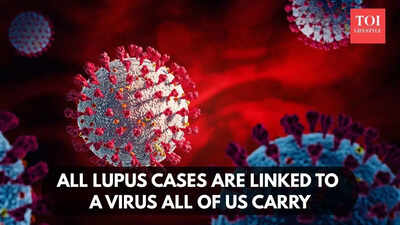
A virus present in nearly all of us could be the culprit behind the chronic autoimmune condition called systemic lupus erythematosus.Lupus has remained a mysterious disease until now. A new, groundbreaking study by Stanford Medicine scientists has found that the Epstein–Barr virus (EBV) is responsible for lupus. About 19 out of 20 Americans silently carry this virus, and it is directly responsible for the disease. The findings of the study are published in the journal Science Translational Medicine.
EBV is linked to lupus
About 5 million people worldwide, and close to a million Americans, have lupus, in which the immune system attacks the contents of cell nuclei. This leads to organ and tissue damage throughout the body, including the skin, joints, kidneys, heart and nerves. The symptoms vary widely among individuals. Chronic fatigue or tiredness is one of the crucial signs of lupus. Also, nine out of 10 lupus patients are women. The reason for this is unknown. There is no cure for this autoimmune disease. Most lupus patients live reasonably normal lives due to appropriate diagnosis and medication. However, it can be life-threatening for 5% of patients.The new findings of the Stanford study add to the mounting evidence that Epstein–Barr is tied to multiple long-term health issues, including other autoimmune conditions.“We think it applies to 100% of lupus cases,” senior author William Robinson, MD, PhD, a professor of immunology and rheumatology, said.
How does one get EBV?
Most people get EBV by the time they reach adulthood. It is transmitted through saliva. An EBV infection typically occurs in childhood from sharing a spoon with, or drinking from the same glass as, a sibling or a friend, or perhaps during our teen years, from exchanging a kiss. This virus can cause mononucleosis, ‘the kissing disease,’ which begins with a fever that subsides but lapses into a profound fatigue that can persist for months.“Practically the only way to not get EBV is to live in a bubble. If you’ve lived a normal life, the odds are nearly 20 to 1 you’ve got it. Once you’ve been infected by EBV you can’t get rid of it, even if you remain or become symptom-free,” Robinson said.It belongs to a large family of viruses, including those responsible for chickenpox and herpes. The majority of those who are infected have no idea about it.“If we now better understand how this fastidious virus is responsible for autoimmune diseases, I think it’s time to figure out how to prevent it,” Dr Anca Askanase, clinical director of the Lupus Center at Columbia University, who wasn’t involved in the new research, added.
Note: The information provided in this article is for educational purposes only and is not intended as medical advice. Always consult a qualified healthcare professional before starting any new medication or treatment, or before changing your diet or supplement regimen.








